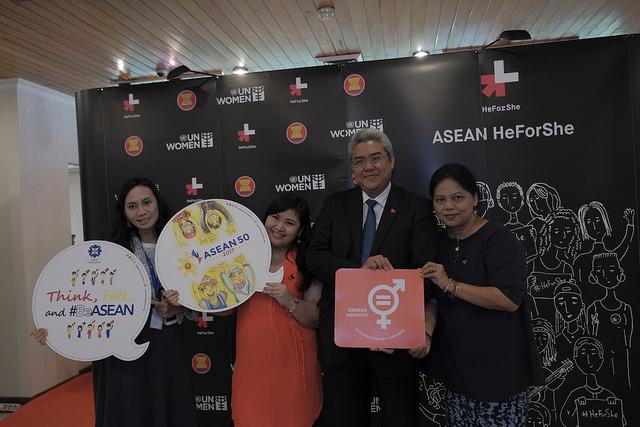
In April this year, Australia hosted the inaugural ASEAN–Australia women, peace and security (WPS) dialogue, an initiative born out of the ASEAN–Australia special summit in March. Although Australia has been involved in regional peacekeeping operations that addressed the WPS agenda, it hadn’t engaged with ASEAN itself on the issue.
ASEAN has also demonstrated its willingness to deal with gender issues such as women’s economic empowerment, violence against women and the advancement of women’s rights. For example, its Commission on the Promotion and Protection of the Rights of Women and Children (ACWC) has played an important role in promoting gender equality since its creation in 2010. Recently, ASEAN also partnered with UN Women to launch the ASEAN HeForShe campaign.
And since the creation of the Sustainable Development Goals (SDGs) in 2015, ASEAN has made noticeable efforts to ensure that gender is included in all pillars of its work, not just within gender-tasked groups such as the ACWC.
Yet it was only late last year that ASEAN adopted a much needed and much more directed focus on WPS. At the 2017 ASEAN summit in Manila, members produced a joint statement promoting WPS. It’s the first and only statement by ASEAN as a whole that acknowledges the gendered effects of armed conflict that UN Security Council Resolution 1325 outlined.
Taking the WPS agenda seriously isn’t only important to understand how conflicts exacerbate inequalities and their consequences for women. It also helps clarify the many roles that women play in conflict, defence and peacekeeping, as well as the positive contributions they make to resolving conflict and to creating lasting peace.
Even so, the peace talks in Myanmar highlight the work that still needs to be done. The Nationwide Ceasefire Agreement agreed that 30% of the participants should be women. But only 17% of the participants at the Union Peace Conference were women. That coupled with the fact that sexual violence has been used as a tactic in the conflict in Myanmar demonstrates that the absence of a proper WPS strategy in the region is detrimental to security.
So what can ASEAN do to consolidate and advance its WPS agenda?
The ASEAN 2025 framework is a promising start. It promises to ‘[w]ork towards achieving gender equality and the empowerment of all women and girls’. The framework advocates mainstreaming gender in peacebuilding and conflict resolution processes, in particular through the ASEAN Institute for Peace and Reconciliation (AIPR).
The institute was established in 2012 but only began operating earlier this year. It will compile data from all of ASEAN’s member states in areas of peacekeeping, conflict management and conflict resolution. That will provide ASEAN with a clear picture of the challenges faced by each of its members, as well as highlighting best practices across the region.
The AIPR has already proven itself to be a much needed platform for discussions about women’s participation. And ASEAN clearly recognised its importance: members recommended that AIPR continue to organise WPS training and workshops, and to create educational resources about WPS.
As important as knowing the WPS challenges in the region is monitoring and evaluating each ASEAN member’s commitments and progress to address those challenges. A good example of effective monitoring is the ASEAN–UN Women-FriedrichEbert-Stiftung 2016 report, Projected Gender Impact of the ASEAN Economic Community. The report mapped women’s economic activities, and outlined existing gender laws and policies in ASEAN countries. A similar mapping is needed for WPS in ASEAN.
Progress in WPS cannot be achieved without holding ASEAN members accountable and responsible for their commitments. That could be achieved by developing a regional action plan and individual national action plans (NAPs). Action plans provide an important bridge between WPS commitments and concrete strategies in individual states. To date, only Indonesia and the Philippines have NAPs. ASEAN has already discussed creating individual NAPs for each member, so this must be a key priority for ASEAN in the future.
Accountability is a third area in which ASEAN needs to improve. For example, the ASEAN Committee on Women produced a 2011–2015 work plan that listed 21 projects and initiatives, identified project timeframes and specified project lead and possible external partner organisations. But there’s almost no trace of follow-up reports to trace those initiatives’ effectiveness.
ASEAN’s regional plan of action to eliminate violence against women and children provides a useful model for creating an action plan for WPS. It’s the most comprehensive policy ASEAN has produced to address gender equality. It outlines eight actions to prevent violence against women, protect and support victims and survivors, amend legal frameworks, and cooperate on capacity building, monitoring and evaluation.
Given the various calls for the development of an ASEAN action plan on WPS, coupled with the fact that other regional organisations such as the African Union and the EU have WPS plans, ASEAN should step up its commitment to the WPS agenda.
ASEAN has the necessary tools at its disposal to ensure that WPS stays firmly on its radar. The organisation’s initial steps are promising. It would be unfortunate for that promise to go unfulfilled.